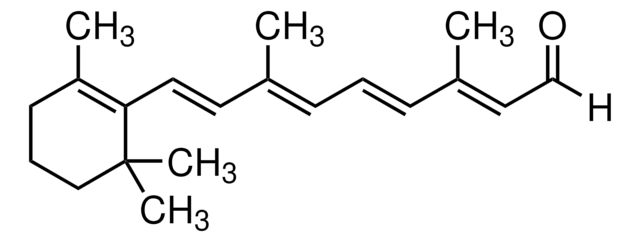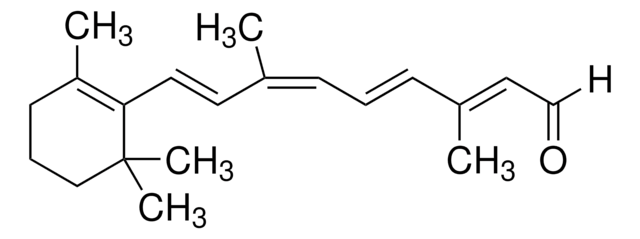87809
Retinyl propionate
≥98.0% (sum of isomers, HPLC), ~2500 U/mg
Synonyme(s) :
Vitamin A propionate
About This Item
Produits recommandés
Source biologique
synthetic
Niveau de qualité
Pureté
≥98.0% (sum of isomers, HPLC)
Forme
liquid
Activité spécifique
~2500 U/mg
Contient
BHT as stabilizer
Impuretés
~5% cis-isomers
Couleur
green-yellow to very dark green-yellow
yellow to very dark yellow
Température de stockage
2-8°C
Chaîne SMILES
CCC(=O)OC\C=C(C)\C=C\C=C(C)\C=C\C1=C(C)CCCC1(C)C
InChI
1S/C23H34O2/c1-7-22(24)25-17-15-19(3)11-8-10-18(2)13-14-21-20(4)12-9-16-23(21,5)6/h8,10-11,13-15H,7,9,12,16-17H2,1-6H3/b11-8+,14-13+,18-10+,19-15+
Clé InChI
SFRPDSKECHTFQA-ONOWFSFQSA-N
Vous recherchez des produits similaires ? Visite Guide de comparaison des produits
Catégories apparentées
Description générale
Application
Actions biochimiques/physiologiques
Définition de l'unité
Mention d'avertissement
Danger
Mentions de danger
Conseils de prudence
Classification des risques
Aquatic Chronic 4 - Repr. 1B
Code de la classe de stockage
6.1C - Combustible acute toxic Cat.3 / toxic compounds or compounds which causing chronic effects
Classe de danger pour l'eau (WGK)
WGK 2
Point d'éclair (°F)
262.4 °F - closed cup
Point d'éclair (°C)
128 °C - closed cup
Équipement de protection individuelle
Eyeshields, Gloves, type ABEK (EN14387) respirator filter
Certificats d'analyse (COA)
Recherchez un Certificats d'analyse (COA) en saisissant le numéro de lot du produit. Les numéros de lot figurent sur l'étiquette du produit après les mots "Lot" ou "Batch".
Déjà en possession de ce produit ?
Retrouvez la documentation relative aux produits que vous avez récemment achetés dans la Bibliothèque de documents.
Les clients ont également consulté
Notre équipe de scientifiques dispose d'une expérience dans tous les secteurs de la recherche, notamment en sciences de la vie, science des matériaux, synthèse chimique, chromatographie, analyse et dans de nombreux autres domaines..
Contacter notre Service technique







